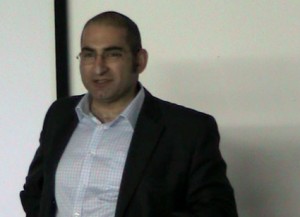We’ ve been hearing a lot recently about the need for a code of practice to guide our students in their use of web 2.0 and social media when part of their learning programme. This was a recurrent theme at last week’ s Teaching & Learning Showcase event on ‘Using technologies to engage students in their learning’ , hosted by the Centre for the Development of Teaching & Learning (CDoTL) here at the University of Reading.

Gerry Leonidas at the Teaching & Learning Showcase event on ‘Using technologies to engage students in their learning’, 24 April 2012
Speakers Kat Bicknell, Gerry Leonidas and Simon Burke shared their experiences of students collaborating on group wikis, taking part in a live poll, and using social media such as Facebook, Twitter and Yammer – and had a tale or two to tell.
Student feedback on such innovative uses of technology in T & L has been overwhelmingly positive, with active and enthusiastic participation from students in online activities. Yet some of the students’ online behaviour has been suprisingly anti-social and unprofessional, with some students less willing to share, overly critical, immature or downright rude.
Simon Burke, who hosted a debate where students were able to contribute via text message using Poll Everywhere and have their comments displayed live on the presentation screen, shared some of the messages that had to be filtered out by the moderator. With almost 50% of students’ comments unsuitable for public consumption, he clearly had his work cut out for him.
Our students may be confident users of sites such as Facebook in their social lives but perhaps less sure about appropriate ways of sharing information online when it comes to their learning and professional activities. Many institutions now publish general guidance on ‘netiquette’ – see the Open University’s advice on ‘Working with others online’ for an example, or our own ‘Expectations surrounding the use of Web 2.0’ which touch on social conduct as well as ethical and legal considerations.
Published just today, this blog post by Jane Adams on ‘Facebook saints vs. Facebook sinners ’ offers her personal reflections on getting the most out of your interactions with family and friends on social media networks. But many of her points are actually about common sense and good manners. Her rough guide to Facebook habits – general tips and advice on posting basic information, status updates, photos, and ‘likes’ – applies equally to learning experiences and professional environments. A positive presence is as important online as it is in any other sphere of human interaction – it is, in fact, a life skill.
We are collating thoughts from our speakers and others to create draft ideas for a code of practice on the use of digital media – for colleagues to adapt to suit the learning outcomes and needs of their students. If you have any thoughts, suggestions or good examples to share, please post them in the comments box or email Maureen Martin at m.t.martin@reading.ac.uk.